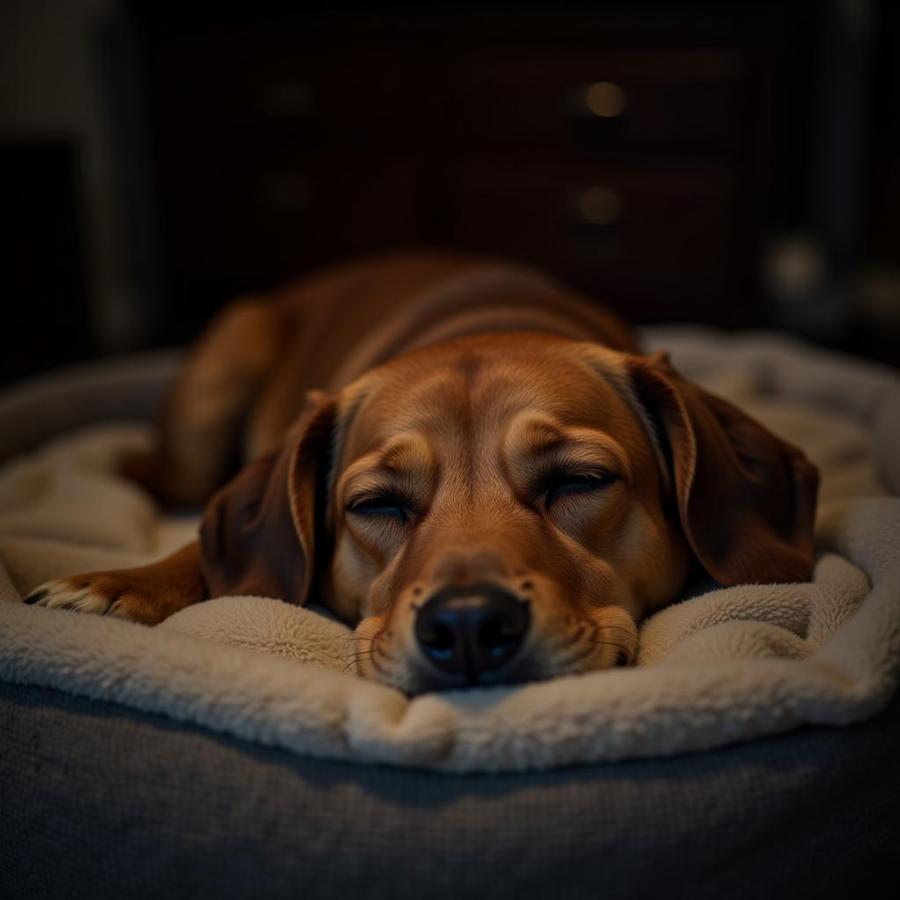Dog whining in sleep can be both endearing and concerning for pet owners. Is your furry friend dreaming of chasing squirrels or is something more amiss? This article delves into the reasons behind dog whining in sleep, helping you decipher whether it’s a harmless dream sequence or a sign of potential health concerns.
Why Do Dogs Whine in Their Sleep?
Just like humans, dogs experience different sleep stages, including REM (Rapid Eye Movement) sleep, where dreaming occurs. During this stage, dogs may exhibit various behaviors like twitching, pawing, and yes, even whining. This is often perfectly normal and simply a reflection of their dream state. They might be reliving a fun day at the park, chasing their favorite toy, or even experiencing a bit of anxiety in a dream scenario.
Is My Dog Having a Nightmare?
While most whining is harmless, excessive or distressed whining could indicate a nightmare. If your dog seems agitated, whimpers intensely, or even cries out in their sleep, they might be experiencing a bad dream. Just as with humans, nightmares can be caused by stress, anxiety, or changes in routine.
When Should I Be Concerned About My Dog Whining in Sleep?
While occasional whining is generally nothing to worry about, consistent and intense vocalizations during sleep could be a sign of underlying health issues. Pain, discomfort, or cognitive decline can manifest as sleep disturbances, including whining, whimpering, and restlessness. anxiety in older dogs can sometimes exhibit changes in sleep patterns.
Deciphering Your Dog’s Sleep Sounds
Understanding the nuances of your dog’s sleep sounds can help you determine whether their whining is cause for concern. Soft whimpers and occasional whines accompanied by relaxed body language are usually indicative of dreaming. However, loud, frequent, or distressed vocalizations coupled with tense body language may signal a problem.
What if My Dog Won’t Stop Whining in Sleep?
If your dog’s whining is persistent and disrupting their sleep, it’s essential to consult a veterinarian. They can rule out any underlying medical conditions and offer advice on managing sleep disturbances. If you are dealing with dog won’t stop yelling in cage it may be a different matter and needs its own exploration.
Creating a Peaceful Sleep Environment for Your Dog
A calm and comfortable sleep environment can promote restful sleep and minimize sleep-related vocalizations. Ensure your dog has a cozy bed, a quiet space, and a consistent bedtime routine. This can help reduce anxiety and promote deeper, more peaceful sleep.
 Creating a calm sleeping environment for dog
Creating a calm sleeping environment for dog
Dr. Emily Carter, a certified veterinary behaviorist, notes, “A consistent bedtime routine can significantly improve a dog’s sleep quality. Just like children, dogs thrive on predictability.”
Conclusion
Dog whining in sleep is a common occurrence, often linked to dreaming. While occasional whimpers are usually harmless, persistent or distressed vocalizations warrant further investigation. By paying attention to the frequency, intensity, and accompanying body language, you can better understand your dog’s sleep sounds and address any potential underlying issues. Ensuring a comfortable sleep environment and consulting with a veterinarian when necessary can help your furry friend enjoy restful, whine-free slumbers.
FAQ
Q: Is it normal for my dog to whine in their sleep?
A: Yes, occasional whining in sleep is usually normal and related to dreaming.
Q: When should I be worried about my dog whining in sleep?
A: Consult a vet if the whining is frequent, intense, accompanied by distressed body language, or disrupts your dog’s sleep.
Q: Can I wake my dog up if they are whining in their sleep?
A: It’s generally best not to wake them unless they seem truly distressed.
Q: How can I create a better sleep environment for my dog?
A: Provide a cozy bed, a quiet space, and a consistent bedtime routine.
Q: Could my dog’s whining be a sign of pain?
A: Yes, it’s possible. Consult your veterinarian to rule out any medical conditions.
Q: What if my dog’s whining gets worse?
A: Contact your veterinarian for professional advice.
Q: Does age affect dog whining in sleep?
A: Senior dogs may whine more due to cognitive decline or discomfort.
You may also be interested in these other articles on Beaut Dogs:
Beaut Dogs is your comprehensive resource for all things related to dog care. From breed selection to health and training, we provide expert advice to help you navigate the joys and challenges of dog ownership. For personalized guidance and support, contact us at Email: [email protected]. Beaut Dogs is committed to helping you build a strong and loving bond with your canine companion.